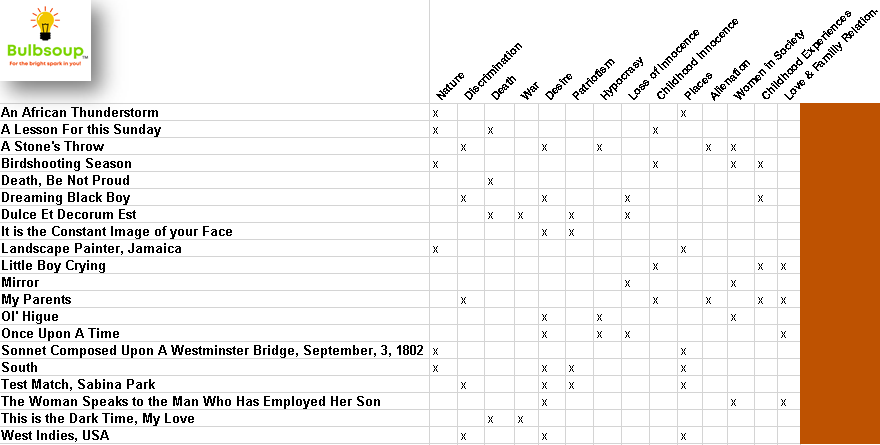Sentry Page Protection
Once Upon A Time
|
|
Gabriel Okara (24 April 1921 – 25 March 2019) was a Nigerian poet and novelist who is best known for his early experimental novel, The Voice (1964), and his award-winning poetry, published in The Fisherman's Invocation (1978) and The Dreamer, His Vision (2005). (more)
|
LITERAL MEANING
A parent is talking to his/ her son and telling him how things used to be. The parent tells the son that people used to be sincere, but are now superficial and seek only to take from others. The persona (www.bulbsoup.com) tells the child that he/she has learned to be just like these people, but does not want to be like that anymore. The parent wants to be as sincere as the son.
A parent is talking to his/ her son and telling him how things used to be. The parent tells the son that people used to be sincere, but are now superficial and seek only to take from others. The persona (www.bulbsoup.com) tells the child that he/she has learned to be just like these people, but does not want to be like that anymore. The parent wants to be as sincere as the son.
|
3. Once upon a time, son,
they used to laugh with their hearts and laugh with their eyes; but now 4. they only laugh with their teeth, 5 while 1. their ice-block eyes 5. search behind my shadow. There was a time indeed they used to 6. shake hands with their hearts; but that's gone, son. 10 Now they shake hands without hearts while their left 7. hands search my empty pockets. 'Feel at home'! 'Come again' ; they say, and when I come 15 again and feel at home, once, twice there will be no thrice - for then I find doors shut on me. So I have learnt many things, son. 20 2. I have learnt to wear many faces like dresses - homeface, officeface, streetface, hostface cocktail face, with all their 2. conforming smiles like a fixed portrait smile. And I have learned, too. 20 to laugh with only my teeth and shake hands without my heart I have also learnt to say, 'Goodbye', when I mean 'Good-riddance' ; to say 'Glad to meet you', 25 without being glad; and to say 'It's been nice talking to you', after being bored. But believe me, son. I want to be what I used to be when I was like you. I want 30 8. unlearn all these muting things. Most of all, I want to relearn how to laugh, for 2. my laugh in the mirror shows only my teeth like a snake's bare fangs! So show me, son, 35 how to laugh; show me how I used to laugh and smile 3. once upon a time when I was like you. Poet: Gabriel Okara |
LITERARY DEVICES
1. METAPHOR
|
IMPORTANT WORDS/ PHRASES
4.'they only laugh with their teeth' (Stanza 1, line 4)
This emphasizes the insincerity of the people around the persona. To laugh with your teeth means that only the bottom half of your face is engaged, the laugh does not reach the eyes.
5. 'shake hands with their heart' (Stanza 1, line 6)
To shake hands with your heart implies a strong handshake that is sincere, this is the opposite of what now occurs between people.
6. 'search behind my shadow' (Stanza 2, line 8)
This implies that the person cannot look the persona in the eye, they are looking everywhere but there. Looking someone in the eye during a (www.bulbsoup.com) conversation implies that one is sincerely interested in what you have to say. Not being able to do so implies shiftiness.
7. 'hands search my empty pockets' (Stanza 2, line 11)
People are only 'seemingly' nice to get something from you. So, they smile with you, but it is not sincere, they are seeking to get something from you.
8. 'unlearn all these muting things' (Stanza 6, line 30)
The word mute means silence, think of what happens when you press the mute button on the TV remote. Therefore, there is an implication that the insincere (www.bulbsoup.com) actions that the persona describes are muting, they block, or silence, good intentions. Hence, the persona wants to 'unlearn' these habits.
4.'they only laugh with their teeth' (Stanza 1, line 4)
This emphasizes the insincerity of the people around the persona. To laugh with your teeth means that only the bottom half of your face is engaged, the laugh does not reach the eyes.
5. 'shake hands with their heart' (Stanza 1, line 6)
To shake hands with your heart implies a strong handshake that is sincere, this is the opposite of what now occurs between people.
6. 'search behind my shadow' (Stanza 2, line 8)
This implies that the person cannot look the persona in the eye, they are looking everywhere but there. Looking someone in the eye during a (www.bulbsoup.com) conversation implies that one is sincerely interested in what you have to say. Not being able to do so implies shiftiness.
7. 'hands search my empty pockets' (Stanza 2, line 11)
People are only 'seemingly' nice to get something from you. So, they smile with you, but it is not sincere, they are seeking to get something from you.
8. 'unlearn all these muting things' (Stanza 6, line 30)
The word mute means silence, think of what happens when you press the mute button on the TV remote. Therefore, there is an implication that the insincere (www.bulbsoup.com) actions that the persona describes are muting, they block, or silence, good intentions. Hence, the persona wants to 'unlearn' these habits.
THEMATIC CATEGORIZATION: Desire, Hypocrisy, Loss of Innocence, Love and Family Relationship
ATMOSPHERE
The mood of the poem is annoyed and disappointed. The persona remembers how things used to be when he was young and innocent, like his son.
The tone of the poem is sad. The poet's response to his nostalgia is sadness.
The mood of the poem is annoyed and disappointed. The persona remembers how things used to be when he was young and innocent, like his son.
The tone of the poem is sad. The poet's response to his nostalgia is sadness.
Contributor: Leisa Samuels-Thomas
Okara, G. 'Once Upon A Time' in A World of Poetry. Edited by Mark McWatt and Hazel Simmonds McDonald. Pearson Education Ltd, 2005.
Okara, G. 'Once Upon A Time' in A World of Poetry. Edited by Mark McWatt and Hazel Simmonds McDonald. Pearson Education Ltd, 2005.





